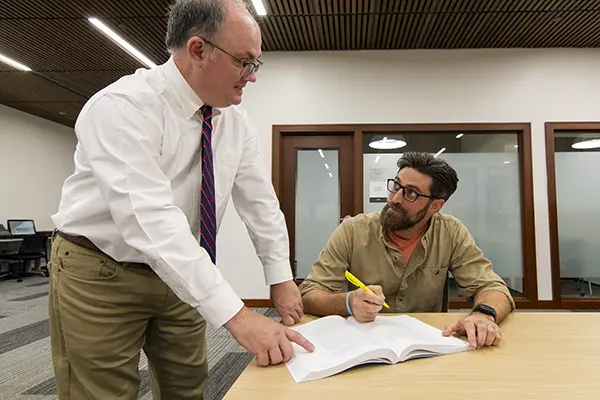The bar exam



Passing the bar exam is a pivotal step in your journey to becoming a practicing attorney. At Washburn Law, our comprehensive bar preparation program stands out by providing unparalleled resources, support, and confidence from day one. Partnered with BARBRI, the gold standard in bar prep, we offer an integrated approach that begins your first year and continues through graduation. With access to an extensive library of study aids, practice questions, MPRE prep, and intensive post-grad review courses, our program ensures you’re equipped to excel on the bar exam and succeed in your legal career.
The NextGen bar exam is an upcoming innovation in bar testing. This exam will test a broad range of foundational lawyering skills, employing a focused set of clearly identified fundamental legal concepts and principles needed in today’s practice of law. Designed to balance the skills and knowledge needed in litigation and transactional legal practice, the exam will reflect many of the key changes that law schools are making today, building on the successes of clinical legal education programs, alternative dispute resolution programs, and legal writing and analysis programs.
Starting in 2026, states will be rolling it out over a span of three years. Missouri will administer the NextGen exam in July of 2026, with Nebraska, Oklahoma, and Iowa following suit in July of 2027, and finally Kansas, Colorado, Texas, and Utah in 2028.

Details about applying for admission to the Kansas bar, including the fee schedule and Petition for Admission, can be found on the Kansas Judicial Branch website.
To obtain a license to practice law in Kansas, applicants must meet the following requirements:
Kansas has adopted the Uniform Bar Exam and requires a score of at least 266 to pass the exam in Kansas.
The February bar exam is given on the last Tuesday and Wednesday in February and the July bar exam is given the last Tuesday and Wednesday in July.
Details about applying for admission to the Missouri bar can be found on the Missouri Board of Law Examiners website. All applicants must start the application process by creating a MBLE registration account.
To obtain a license to practice law in Kansas, applicants must meet the following requirements:
Missouri has adopted the Uniform Bar Exam and requires a score of at least 260 to pass the exam in Kansas.
The February bar exam is given on the last Tuesday and Wednesday in February and the July bar exam is given the last Tuesday and Wednesday in July.
If you plan to practice law outside of Kansas and Missouri, you should reach out to the board of bar examiners in your desired state to determine deadlines, specific requirements and registration details.
Generally, the bar exam consists of one-day of state-specific essay questions and one day of Multistate Bar Examination (MBE) multiple-choice questions. Many states also require the Multistate Essay Examination (MEE) and the Multistate Performance Test (MPT).
The Multistate Bar Examination (MBE) is a component of the UBE consisting of multiple-choice questions that assess the understanding of fundamental legal principles.
The Multistate Essay Examination (MEE) is a component of the UBE consisting of six 30-minute questions that tests the ability to identify legal issues and present a reasoned analysis of relevant issues to a hypothetical factual situation.
The Multistate Performance Test (MPT) is a component of the UBE consisting of two 90-minute items that assess the ability to apply the law to "real-life scenarios."